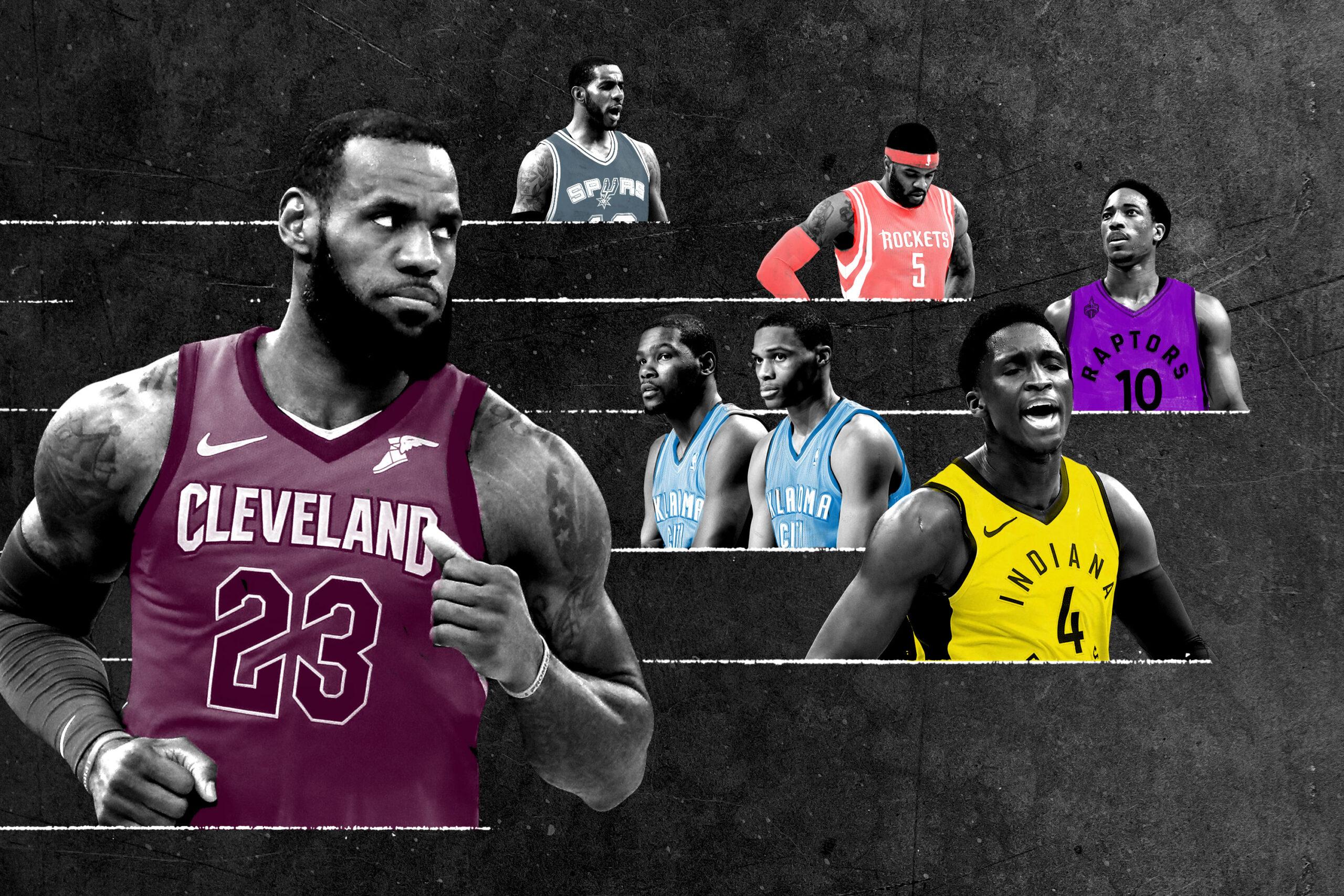
LeBron James says he isn’t worried—he’s come back from worse deficits against better teams before. Indiana stunned Cleveland in Game 1 of their first-round series to take a 1-0 lead and wrest home-court advantage away from the Cavaliers, but James has a postseason track record that elicits confidence. He’s the star of seven straight trips to the NBA Finals, and just two years ago he orchestrated one of the most dramatic comebacks in NBA history. His record in Round 1 is also spotless: Sunday marked James’s first loss in the first round since 2012, and his first Game 1 loss in the first round ever.
None of the fleeting challengers to James’s Eastern Conference throne this decade—the Rose-and-Thibs Bulls, the George-and-Hibbert Pacers, the Team of the Month Hawks—managed to beat him four times before the Finals, and if any contender were to do so this year, it would be Brad Stevens or Joel Embiid or a modernized DeMar DeRozan. This overlooked Indiana team wasn’t expected even to make the playoffs this season after trading Paul George, and once it settled into the 4-5 matchup against Cleveland, its fate seemed quick and preordained: Before the playoffs began, 22 NBA writers predicted the series for ESPN, and all 22 picked Cleveland to win.
Then the Pacers stomped the Cavs on Sunday, 98-80, in Cleveland. They led by 19 after the first quarter and barely relented. Just two Cavaliers other than James scored double-digit points, and not a single player on the roster had a positive plus-minus. Cleveland looks like it’s in trouble. And, James’s relaxed attitude and comeback legacy aside, history agrees.
Since the playoff field expanded to 16 teams in 1983-84, teams that hosted Game 1 won the series 76.1 percent of the time. That’s to be expected—teams that start a series at home have both a better regular-season record and the advantage of an extra home game. That percentage plummets, though, for teams that host Game 1 and lose: Just 44.4 percent of such teams ended up winning the series. In other words, the history of teams in similar spots suggests that the Cavaliers have slightly worse than a coin flip’s chance of coming back in the series. And it may be even worse when factoring in the Pacers’ margin of victory.
Playoff Series Outcomes Since 1983-84
The Cavs would fit in that last category, though the grouping has a tiny sample, which confirms the rarity of Indiana’s Game 1 blowout and reduces the power of its conclusions. But none of the trends in that chart are encouraging for Cleveland, which must now win at least one game in Indiana—where the Cavs are 0-2 this season—to advance to the next round.
Still, most observers would probably favor the Cavs to come back in the series, given James’s playoff history, and there are some underlying positives in the analysis that might support this unyielding belief in his playoff powers. First, many of those past series were best-of-fives rather than best-of-sevens, and in a shorter series, a one-game advantage is even more important. If they don’t lose another home game in the series, the Cavs will have three chances to steal a game in Indiana; were they playing in a best-of-five format, they’d have just two. Teams that have lost by 10-plus points at home in Game 1 have won 32.4 percent of those series overall, but that rate rises to 43.5 percent when considering only best-of-seven affairs.
Second, the Cavaliers have considerable recent precedent for turning an opening-game humiliation at home into a series win. Two teams accomplished the feat just last season: the Spurs, who lost 126-99 to the Rockets in their Western Conference semifinal opener before winning the series in six, and the Raptors, who overcame a 97-83 first-round loss to the Bucks to do the same. The 2015-16 Raptors also beat the Pacers after dropping a Game 1 blowout by double digits; the 2014-15 Rockets completed the strangest comeback—Josh Smith made three clutch 3s!—of the last decade to steamroll the Clippers; and the 2013-14 and 2010-11 Thunder, who outlasted the Clippers and Grizzlies, respectively, despite sizable Game 1 losses.
And third, if Cleveland does poach a Pacers home game and eventually push the series to seven games, it would have the advantage. That’s an obvious statement to make, perhaps, but the history bears it out: All six teams that have forced a Game 7 after a double-digit Game 1 loss have won that decisive game at home.
Those tricks are easier said than accomplished for the Cavaliers, of course, who must first address the underlying problems that caused their Game 1 shellacking. Indiana won on Sunday because of its defense, which held the Cavs to their second-lowest point total of the season, and because Victor Oladipo scored 32 points without any resistance. Freed from Russell Westbrook’s shadow, the Pacers guard should be a unanimous selection as the Most Improved Player, and he was one of the league’s best two-way contributors this season. Now he’s flashing those talents on a playoff stage for the first time; as Haley O’Shaughnessy noted, he made as many 3s (six) in Game 1 as he did in his playoff career before Sunday.
Cleveland didn’t manage to slow Oladipo in the regular season, either: The Pacers guard averaged 25 points, five assists, and 4.8 rebounds per game, and made 47 percent of his 3-pointers in four matchups against Cleveland’s forgiving defense. All of those contests came before the Cavaliers’ much-ballyhooed roster overhaul at the trade deadline, but the team didn’t fare any better on defense with their new rotation. Before the All-Star break, they allowed 109.8 points per 100 possessions; after, they allowed 109.0.
Based on the Cavs’ respective regular-season performances, their Game 1 struggles aren’t too great a surprise—Cleveland was only two games better in the regular season, with a worse net rating than the Pacers, and Indiana won three of four regular-season meetings. But James can amass a triple-double on one night and score 45 points the next; he can control the offense and record series-saving chasedown blocks if needed. If Cleveland is to hurdle Indiana, he—and, to a lesser extent, Kevin Love, who scored just nine points in Game 1—will need to transcend the mediocre roster around him. It’s just that his chances of doing so are lower now than they were before Indiana struck first.


